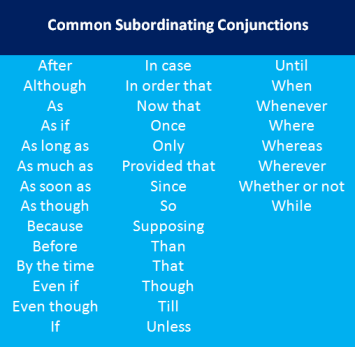What Are
Conjunctions?
Conjunctions are words used to join clauses, phrases or words together. Conjunctions can help you make compound and complex sentences instead of relaying on simple sentences.
For
example
My cat
likes milk and fish.
She drinks
slowly and freely.
Types of conjunctions
There are three types of conjunctions:
Coordinating conjunctions
Correlative conjunctions
Subordinating conjunctions
Coordinating conjunctions
Coordinating conjunctions help you connect clauses to clauses, phrases to phrases and words to words.
Actually, there are seven coordinating conjunctions:
And but for nor or so yet
(Also, known as FANBOYS)
Coordinating conjunctions (FANBOYS) | Infographic
 |
| Coordinating conjunctions |
Lora
invited Tom and Lucy.
She’s upset,
for she has been waiting for them, too long.
They didn’t show up, so she decided to call them.
Tom likes
parties, but Lucy prefers calm.
Correlative Conjunctions
Correlative conjunctions come in pairs to correlate equal structures. The most common pairs of correlative conjunctions are:
Either. . .or neither. . . nor
both. . . and not only. . . but also
Common correlative conjunctions | Infographic
 |
| Correlative conjunctions |
He is not
only rich but also healthy.
Subordinating Conjunctions
A subordinating conjunction is a word that connects a subordinate or dependent clause to an independent clause. Subordinating conjunctions and subordinate clauses establish a condition, a concession, a place, a reason or a time for the main clause.
Examples
My friend Lisa
helps people, although she is poor.
She can accept your proposal, provided that it is convenient to her.
I don’t like
violence because I dislike seeing people in pain.
Common
subordinating conjunctions
|
After Although
As As if As
long as As
much as As
soon as As
though Because
Before In order that Now that |
By the time Even if Even though If Once Only Provided
that Since So Supposing That Though |
Till Unless Until When Whenever
Where Whereas
Wherever
Whether
or not While
|

Comments
Post a Comment